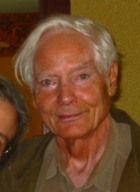W. S. Merwin | |
|---|---|
 Merwin in 2003 | |
| Born | William Stanley Merwin September 30, 1927 New York City, U.S. |
| Died | March 15, 2019 (aged 91) Haiku, Hawaii, U.S. |
| Occupation | Poet |
| Education | Princeton University (attended) |
| Period | 1952–2019 |
| Genre | Poetry, prose, translation |
| Notable awards | See below |
| Spouse | Dorothy Jeanne Ferry Dido Milroy Paula Dunaway (1983–2017) |
| Signature | |
William Stanley Merwin (September 30, 1927 – March 15, 2019) was an American poet who wrote more than fifty books of poetry and prose and produced many works in translation.[1] During the 1960s anti-war movement, Merwin's unique craft was thematically characterized by indirect, unpunctuated narration. In the 1980s and 1990s, his writing influence derived from an interest in Buddhist philosophy and deep ecology. Residing in a rural part of Maui, Hawaii, he wrote prolifically and was dedicated to the restoration of the island's rainforests.
Merwin received many honors, including the Pulitzer Prize for Poetry in 1971 and 2009;[2] the National Book Award for Poetry in 2005,[3] and the Tanning Prize — one of the highest honors bestowed by the Academy of American Poets — as well as the Golden Wreath of the Struga Poetry Evenings. In 2010, the Library of Congress named him the 17th United States Poet Laureate.[4][5] Alongside co-author Takako Lento, he received the Japan–U.S. Friendship Commission Prize for the Translation of Japanese Literature in 2013 for their translation of Collected Haiku of Yosa Buson.[6]
- ^ "Amazon.com Official Profile". Amazon. Retrieved October 7, 2012.
- ^ "Poetry". Past winners & finalists by category. The Pulitzer Prizes. Retrieved April 8, 2012.
- ^ "2005 National Book Awards Winners and Finalists, The National Book Foundation". Nationalbook.org. Retrieved January 21, 2018.
- ^ Kennicott, Philip (July 1, 2010). "W. S. Merwin, Hawaii-based poet, will serve as 17th U.S. laureate". The Washington Post. Retrieved July 1, 2010.
- ^ Cohen, Patricia (June 30, 2010). "W. S. Merwin to Be Named Poet Laureate". The New York Times. Retrieved July 9, 2010.
- ^ "Archive of past prize winners for the Japan-U.S. Friendship Commission Prize for the Translation of Japanese Literature". Donald Keene Center. Retrieved February 26, 2024.